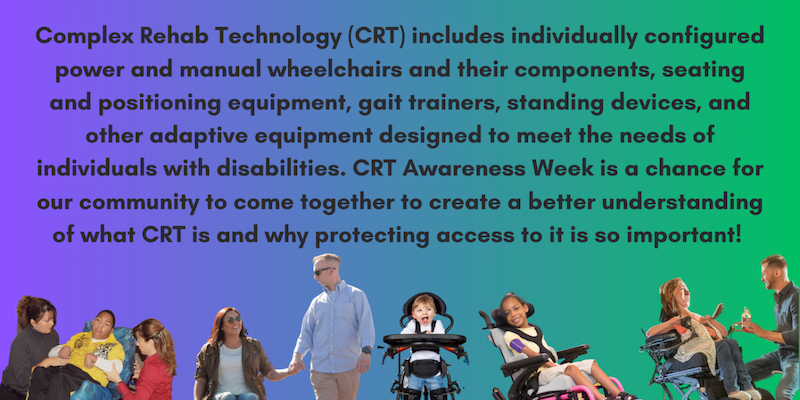Did you know that National CRT Awareness Week is August 13th through August 18th, 2023. During this week, the Complex Rehab Technology (CRT) community joins together to spread the message about the benefits and need for CRT.
CRT products are medically necessary. They are designed to meet the unique physical, mental, and functional needs of individuals with congenital disorders, neuromuscular diseases, injuries, or trauma.
CRT products, such as configured wheelchairs, power wheelchairs, seating and positioning systems, and other types of adaptive equipment, help people increase their mobility and improve their quality of life.
In honor of CRT Awareness Week, here’s a look at the value of complex rehab technology.
Primary Diagnosis and CRT
There are many people dealing with congenital disease, chronic illness, or injury who can benefit from CRT. Some diagnoses that may require CRT include:
- Traumatic brain injury
- Spinal cord injury
- Muscular Dystrophy
- Cerebral palsy
- Amyotrophic Lateral Sclerosis
- Multiple Sclerosis
- Spinal Bifida
- Osteogenesis Imperfecta
- Arthrogryposis
- Demyelinating disease
- Myopathy
- Myelopathy
- Post-Polio Syndrome
- Anterior horn cell disease
- Huntington’s Disease
- Dystonia
- Progressive Muscular Atrophy
- Cerebellar degeneration
- Spinocerebellar disease
- Certain amputations
- Paralysis
- Other diseases and disabilities as determined
The Need for CRT
To determine an individual’s need for CRT products or services, consideration is given to their immediate needs as well as their anticipated future medical and functional needs.
Needs to consider include:
- Activities of daily living (ADL)
- Instrumental activities of daily living (IADL)
- Communication
- Functional mobility
- Pressure redistribution
- Positioning
CRT is used for all of these needs. The goal is to help individuals accomplish tasks as independently, safely, and timely as possible in any environment.
Appropriate CRT Users
Although a diagnosis of a congenital disorder, degenerative neuromuscular disease, injury, or trauma may be a good place to start with CRT, recipients are not limited to these diagnoses.
Seating evaluations help identify the need for CRT. An appropriate complex rehabilitation technology user is someone who:
- Needs a wheelchair for everyday mobility
- Sits in a wheelchair for extended periods of time
- Has balance issues while sitting
- Needs assistance maintaining posture
- Experiences pain while sitting
- Has or is at risk for postural deformities
- Needs configuration, support, or adjustment to maintain posture
- Needs assistance to protect skin
- Needs help to maximize function
- Experiences difficulty maneuvering on certain surfaces or terrain
- Has tonal abnormalities that affect positioning and mobility
- Has a progressive medical condition
CRT Products
Everyone is different and so are their CRT needs. Rehab technicians are trained to fit mobility equipment to meet your individual needs.
For safety reasons, CRT must come from a certified rehabilitation technology supplier.
Some mobility equipment and supplies include:
- Complex power wheelchair that tilts, reclines, or both
- Power assist wheelchair
- Standard Power Wheelchair
- Manual wheelchair
- Custom cushions, laterals, backrests, headrests, pummels, and more
- Standing frames
- Adaptive seating
- Gait trainers
- Bathroom equipment
- Bikes and recreational products
The CRT Process
CRT is designed to meet people’s medical needs and maximize their opportunities for mobility and a better quality of life. The proper process for obtaining CRT involves two components.
The Clinical Component
The clinical component of CRT involves:
- Evaluating the individual’s physical and functional needs
- Goal setting
- The treatment plan
- Preliminary device feature determination
- Fittings
- Function related training
- Trials or simulations
- Determination of outcomes
- Follow-up evaluation
The clinical team provides the prescription and the supporting documents that verify the medical necessity for CRT.
The Technology-Related Component
The technology-related component involves:
- Evaluation of the home environment, if needed
- Technology assessment
- Transportation assessment
- Equipment demonstration
- Trials and simulations
- Match products to individual medical, physical, and functional needs
- Product system assembly
- Fittings and adjustments
- Programming
- Product training and follow-up
- Ongoing product service and repair
CRT Professionals
The provision of CRT typically involves an interdisciplinary team. The team consists of a medical provider, a physical or occupational therapist, and a rehab technology professional.
The CRT team provides clinical and technology-related services. The clinical team evaluates the individual’s medical and functional needs. They consider the individual’s wishes and input about their own needs.
These needs are matched to the appropriate products and services that will benefit the individual and improve their mobility or quality of life.
Licensed and certified occupational and physical therapists provide clinical CRT services. Registered or credentialed rehab technology professionals provide technology CRT services.
Rehab and mobility products can be customized to optimize mobility and provide comfort and security for the user.
CRT Awareness Week
CRT plays such a valuable role in the lives of people who need mobility assistance and adaptive technology. Providing better access to CRT is essential. The goal is to ensure everyone who could benefit from these products receives them.
It’s so important to bring attention and awareness about the benefits of CRT in people’s lives. This is the best way to advocate for CRT and stress the need for more access for those who need these unique products and services.
Understanding the Benefits of Complex Rehab Technology
Complex rehab technology helps meet the needs of people with a wide range of illnesses, disabilities, injuries, and mobility issues. CRT helps address patients’ unique medical needs and maximize their mobility and independence.
Freedom Mobility Center, Inc. is one of the largest independent providers of complex power wheelchairs in North Carolina, South Carolina, Virginia, West Virginia, and Georgia. We specialize in providing the correct power wheelchair or complex rehab chair for our customer’s needs.
We follow all Medicare guidelines for power mobility devices. Our mobility specialists and assistive technology professionals are dedicated to providing the best PMDs for our patients who require them.
Contact Freedom Mobility Center, Inc. today to see how we can assist you.

